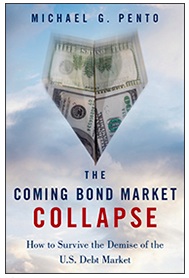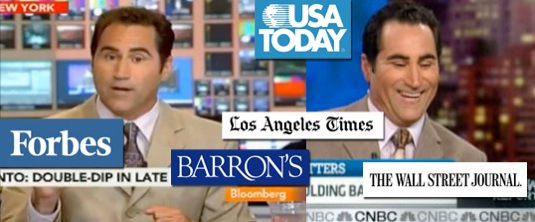Michael Pento: President of Pento Portfolio Strategies – Mr. Pento is a well-established specialist in the Austrian School of economics and a regular guest on CNBC, Bloomberg, FOX Business News, King World News and other national media outlets
On the PentoPort.com site you can find all of Mr. Pento’s latest commentaries and media appearances. You can also leave your contact information in order to learn more about Pento’s Portfolio Strategies.

The Coming Bond Market Collapse: How to Survive the Demise of the U.S. Debt Market – Editorial Review – From the Inside Flap: A book that is certain to spark controversy within the financial media and throughout the halls of government, The Coming Bond Market Collapse sounds a clarion call to investors, business leaders, and policymakers. Author Michael Pento, a noted adherent of the Austrian school of economics theories, compellingly argues that the United States is fast approaching the end stage of the biggest asset bubble in history. He describes how the bursting of that bubble will trigger a massive interest rate shock that will send the U.S. consumer-driven economy and the U.S. government—now pumped up by massive Treasury debt—into bankruptcy, an event that, in turn, will send violent shockwaves throughout the global economy.
Backed by a wealth of historical and economic data, Mr. Pento examines how the policies followed by both the Federal Reserve and private industry have led, inexorably, to the impending disaster, and he exposes alarming parallels between the U.S. and European debt crises.
But this book isn’t all doom and gloom. A top market analyst who accurately foretold the bursting of the housing bubble in most major print and TV media, Michael Pento also provides well-reasoned solutions that government, industry, and individual investors can take to insulate themselves against the coming crisis.
Just as importantly, Mr. Pento delivers proven strategies and tools investors can use to successfully navigate the rocky times ahead and to not only survive the crisis, but capitalize on it.
Thoughtful, meticulously researched and cogently argued, The Coming Bond Market Collapse:
- Paints an alarmingly vivid picture of the inevitable interest rate shock that will send consumers and the government into bankruptcy
- Explains how the bubble was created and proposes realistic policy solutions that government can deploy to cushion the shock
- Explores debt debacles throughout history and speculates what a bond market crisis will look like and how it will affect the standard of living in the United States and globally
- Compares the shaky state of the U.S. economy to the EU and Japanese economies and speculates on how much longer the fiat currency model can continue to sustain them
- Explains why retirees, in particular, will be at risk as real estate prices decline, pensions weaken, and the bond bubble bursts
- Provides sound investment strategies for protecting yourself and your hard-earned assets against the coming financial apocalypse
The Coming Bond Market Collapse gives you the information you need to make sense of and prepare for the looming economic debacle. It provides you with tested strategies for insulating yourself against the most violent shocks that follow. And it arms you with tools for thriving financially, even in the midst of what could be a disaster worse than the Great Depression.



